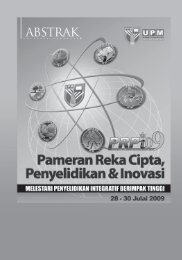BUKU ABSTRAK - Universiti Putra Malaysia
BUKU ABSTRAK - Universiti Putra Malaysia
BUKU ABSTRAK - Universiti Putra Malaysia
Create successful ePaper yourself
Turn your PDF publications into a flip-book with our unique Google optimized e-Paper software.
Factors Influencing Social Activism among Campus Youth in Sri Lanka<br />
Keywords: Social activism, campus youth, Sri Lanka<br />
Prof. Dr. Azimi Hamzah<br />
Shanta Abeysinghe and Sharifah Md. Nor<br />
Institute of Social Science Studies, University <strong>Putra</strong> <strong>Malaysia</strong>,<br />
43400 UPM Serdang, Selangor, <strong>Malaysia</strong>.<br />
+603-8946 8230; azimi@putra.upm.edu.my<br />
Cost-system Functionality and the Performance of the <strong>Malaysia</strong>n Palm Oil Industry<br />
Prof. Dr. Foong Soon Yau<br />
Neilson Anak Teruki<br />
Graduate School of Management, University <strong>Putra</strong> <strong>Malaysia</strong>,<br />
43400 UPM Serdang, Selangor, <strong>Malaysia</strong>.<br />
+603-8946 7438; syfoong@putra.upm.edu.my<br />
Keywords: Cost accounting system, organisational performance, oil palm enterprises, <strong>Malaysia</strong><br />
177<br />
Social Sciences<br />
Youths are constantly searching for a social identity and citizenry to express their inner concerns, and realize<br />
their national development. Within this context, this study identifies social activism as a means for building<br />
youths’ identity and citizenry. Numerous studies have indicated that the search for identity and citizenry is<br />
greatly influenced by both contextual and demographic factors. This paper aims to discuss the findings of a study<br />
pertaining to the contextual and demographic variables that influence social activism among campus youths in Sri<br />
Lanka. Corning’s measures of Social Activism Orientation were adapted for this study to measure social activism.<br />
The findings of this study suggest that youths, irrespective of rural and urban, coming from low income or high<br />
income households, belonging to different fields of studies or have parents with different levels of engagement in<br />
political activities, have equal levels of engagement in social activism in college campuses. However, significant<br />
differences were indicated between youths’ gender, war and non-war location context, and if their campuses are<br />
long established or newly established universities. The impact of universal free education policy is discussed<br />
with special reference to youth empowerment. Existing constrains and the lack of a youth-centered development<br />
approach and an existing institutional socio political culture on campus are also discussed.<br />
Turbulence in the marketplace necessitates adaptation of the cost system design to meet the changing information needs<br />
of managers (Johnson, 1990; Mia and Chenhall, 1994). Despite the assumed causal link between cost-system functionality and<br />
performance, the empirical evidence that support such a relationship is lacking and prior studies on efficacy of cost system<br />
sophistication is inconclusive and mixed. This study investigates the relationship between cost-system functionality and the<br />
performance of oil palm enterprises in <strong>Malaysia</strong>, as well as whether manager’s perceived usefulness of cost information<br />
mediates the cost-system functionality-performance relationship. A structured questionnaire was used to gather data from oil<br />
palm enterprises located only in Sarawak to avoid the confounding effects of weather and soil conditions on performance. The<br />
results indicate that the cost relevance/timeliness dimension of cost-system functionality significantly enhances the performance<br />
of oil palm enterprises. However, manager’s perceived usefulness of cost information only partially mediates the cost-system<br />
functionality-non-financial performance relationship, and this is likely due to the centralised control exercised by the head<br />
office over its estate operations. This study indicates that the efficacy of cost system is contingent on environmental uncertainty.<br />
High-functional cost system is cost efficient and beneficial only when environment is highly uncertain. The oil palm enterprises<br />
are operating in a highly turbulent economic environment due to serious external challenges, such as rising costs of production<br />
inputs, stagnating yield, labor shortage and massive subsidies for production of competing crops. By selecting only oil palm<br />
enterprises for this study to ensure the operational homogeneity, the effects of cost-system functionality on performance could be<br />
examined in a more controlled setting, and this differs from prior cross-sectional studies based on firms from diverse industries.<br />
By analysing the attributes of cost-system functionality into two major dimensions, this study also shows that only relevant and<br />
timely cost information could enhance performance.



